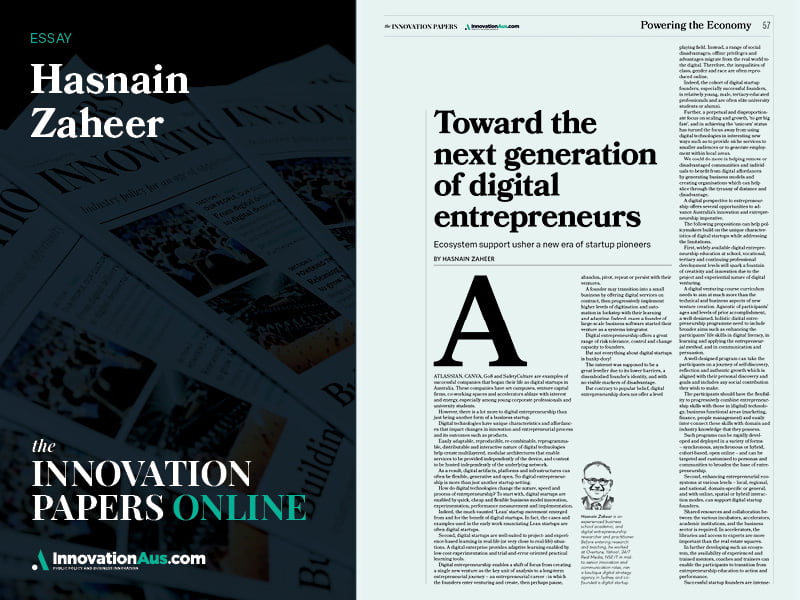Atlassian, Canva and SafetyCulture are examples of successful companies that began their life as digital startups in Australia. These companies have set campuses, venture capital firms, co-working spaces and accelerators ablaze with interest and energy, especially among young corporate professionals and university students.
However, there is a lot more to digital entrepreneurship than just being another form of a business startup.
Digital technologies have unique characteristics and affordances that impart changes in innovation and entrepreneurial process and its outcomes such as products.

Easily adaptable, reproducible, re-combinable, reprogrammable, distributable and interactive nature of digital technologies help create multilayered, modular architectures that enable services to be provided independently of the device, and content to be hosted independently of the underlying network.
As a result, digital artifacts, platforms and infrastructures can often be flexible, generative and open. So digital entrepreneurship is more than just another startup setting.
How do digital technologies change the nature, speed and process of entrepreneurship? To start with, digital startups are enabled by quick, cheap and flexible business model innovation, experimentation, performance measurement and implementation.
Indeed, the much-vaunted ‘Lean’ startup movement emerged from and for the benefit of digital startups. In fact, the cases and examples used in the early work enunciating Lean startups are often digital startups.
Second, digital startups are well-suited to project- and experience-based learning in real-life (or very close to real-life) situations. A digital enterprise provides adaptive learning enabled by low-cost experimentation and trial-and-error-oriented practical learning tools.
Digital entrepreneurship enables a shift of focus from creating a single new venture as the key unit of analysis to a long-term entrepreneurial journey – an entrepreneurial career – in which the founders enter venturing and create, then perhaps pause, abandon, pivot, repeat or persist with their ventures.
A founder may transition into a small business by offering digital services on contract, then progressively implement higher levels of digitisation and automation in lockstep with their learning and adapting. Indeed, many a founder of large-scale business software started their venture as a systems integrator.
Digital entrepreneurship offers a great range of risk tolerance, control and change capacity to founders.
But not everything about digital startups is hunky-dory!
The internet was supposed to be a great leveller due to its lower barriers, a disembodied founder’s identity, and with no visible markers of disadvantage.
But contrary to popular belief, digital entrepreneurship does not offer a level playing field. Instead, a range of social disadvantages, offline privileges and advantages migrate from the real world to the digital. Therefore, the inequalities of class, gender and race are often reproduced online.
Indeed, the cohort of digital startup founders, especially successful founders, is relatively young, male, tertiary-educated professionals and are often elite university students or alumni.
Further, a perpetual and disproportionate focus on scaling and growth, ‘to get big fast’, and in achieving the ‘unicorn’ status has turned the focus away from using digital technologies in interesting new ways such as to provide niche services to smaller audiences or to generate employment within local areas.
We could do more in helping remote or disadvantaged communities and individuals to benefit from digital affordances by generating business models and creating organisations which can help slice through the tyranny of distance and disadvantage.
A digital perspective to entrepreneurship offers several opportunities to advance Australia’s innovation and entrepreneurship imperative.
The following propositions can help policymakers build on the unique characteristics of digital startups while addressing the limitations.
First, widely available digital entrepreneurship education at school, vocational, tertiary and continuing professional development levels will spark a fountain of creativity and innovation due to the project and experiential nature of digital venturing.
A digital venturing course curriculum needs to aim at much more than the technical and business aspects of new venture creation. Agnostic of participants’ ages and levels of prior accomplishment, a well-designed, holistic digital entrepreneurship programme need to include broader aims such as enhancing the participants’ life skills in digital literacy, in learning and applying the entrepreneurial method, and in communication and persuasion.
A well-designed program can take the participants on a journey of self-discovery, reflection and authentic growth which is aligned with their personal discovery and goals and includes any social contribution they wish to make.
The participants should have the flexibility to progressively combine entrepreneurship skills with those in (digital) technology, business functional areas (marketing, finance, people management) and easily inter-connect these skills with domain and industry knowledge that they possess.
Such programs can be rapidly developed and deployed in a variety of forms – synchronous, asynchronous or hybrid, cohort-based, open online – and can be targeted and customised to personas and communities to broaden the base of entrepreneurship.
Second, enhancing entrepreneurial ecosystems at various levels – local, regional, and national, domain-specific or general, and with online, spatial or hybrid interaction modes, can support digital startup founders.
Shared resources and collaboration between the various incubators, accelerators, academic institutions, and the business sector is required. In accelerators, the libraries and access to experts are more important than the real estate squares.
In further developing such an ecosystem, the availability of experienced and trained mentors, coaches and trainers can enable the participants to transition from entrepreneurship education to action and performance.
Successful startup founders are intensely motivated to ‘pay-it-forward’ in generational cycles of mentoring and support. Platforms within entrepreneurial ecosystems can be developed to provide support systems (e.g., enable founders-mentors matching) in order to satisfy the experienced founders’ desire to contribute.
However, founders’ inputs are often limited by their own contextual variables such as the time at which they founded their own venture, their approach, their industry, and background.
Therefore, mentoring and coaching programmes need to facilitate individual as well as group-level tie-ups without precluding long-term relationships. Mentors need to be provided with train-the-trainer support.
Third, a Centre of Excellence (CoE) in teaching and research in digital entrepreneurship can contribute to not just leading interdisciplinary research at the intersection of entrepreneurship, strategy and IT globally, but also contribute to entrepreneurship education and support the entrepreneurial ecosystems within Australia.
And finally, the government needs to consider the future growth and development of digital entrepreneurship in introducing legislation or institutional and regulatory frameworks specific to digital products and services such as multi-sided platforms.
Government agencies need to take more inclusive approaches such as broadly accessible education and ecosystems approaches as opposed to funding competitive grants and awards.
The ‘pick-the-winner’ style contests are inappropriate for the long-term entrepreneurial journey approach and an iterative, experiment-driven startup development process of digital startup founders, especially at their early stages of development
However well-intentioned, the decision-makers – whether bureaucrats or panels of experienced founders – are limited by their context, and the results are perceived by founders as irrational and the process as opaque.
Adopting a digital technology perspective to innovation and entrepreneurship can contribute to advancing the innovation agenda of the country. Broadly accessible experiential entrepreneurship learning can lead to outcomes that go beyond the creation of a few hundred digital startups.
Such educational programs can unlock the doors to a nation of human problem-solvers who are skilled in the use of entrepreneurial method which is claimed to have the potential to “reformulate entrepreneurship as a method of human action, comparable to social forces such democracy and the scientific method, namely, a powerful way of tackling large and abiding problems at the heart of advancing our species”.
A closely connected entrepreneurial ecosystem network consisting of startup founders, researchers, government agencies and service providers can help develop and then distribute best practices (e.g., maturity models), research, libraries, advice and mentoring.
Hasnain Zaheer is an experienced business school academic, and digital entrepreneurship researcher and practitioner. Before entering research and teaching, he worked at Overture, Yahoo!, 24/7 Real Media, NSE.IT in mid-to-senior innovation and communication roles, ran a boutique digital strategy agency in Sydney and co-founded a digital startup.
Footnotes
Dy, A. M., Marlow, S., & Martin, L. (2017). A Web of opportunity or the same old story? Women digital entrepreneurs and intersectionality theory. Human relations, 70(3), 286-311. https://doi.org/10.1177/0018726716650730
Nambisan, S. (2017). Digital entrepreneurship: Toward a digital technology perspective of entrepreneurship. Entrepreneurship: Theory and Practice, 41(6), 1029–1055. https://doi.org/10.1111/etap.12254
Sarasvathy, S. D., & Venkataraman, S. (2011). Entrepreneurship as method: Open questions for an entrepreneurial future. Entrepreneurship Theory and Practice, 35(1), 113–135
Zaheer, H., Breyer, Y., & Dumay, J. (2019a). Digital entrepreneurship: An interdisciplinary structured literature review and research agenda. Technological Forecasting and Social Change, 148. https://doi.org/10.1016/j.techfore.2019.119735
Zaheer, H., Breyer, Y., Dumay, J., & Enjeti, M. (2019b). Straight from the horse’s mouth: Founders’ perspectives on achieving ‘traction’ in digital start-ups. Computers in Human Behavior, 95, 262–274. https://doi.org/10.1016/j.chb.2018.03.002
Zaheer, H., Breyer, Y., Dumay, J., & Enjeti, M. (2022). The entrepreneurial journeys of digital start-up founders. Technological Forecasting and Social Change, 179. https://doi.org/10.1016/j.techfore.2022.121638
Zaheer, H. (2020). Digital entrepreneurship: Review, trajectory & practice. Macquarie University. http://hdl.handle.net/1959.14/1271716
Do you know more? Contact James Riley via Email.

